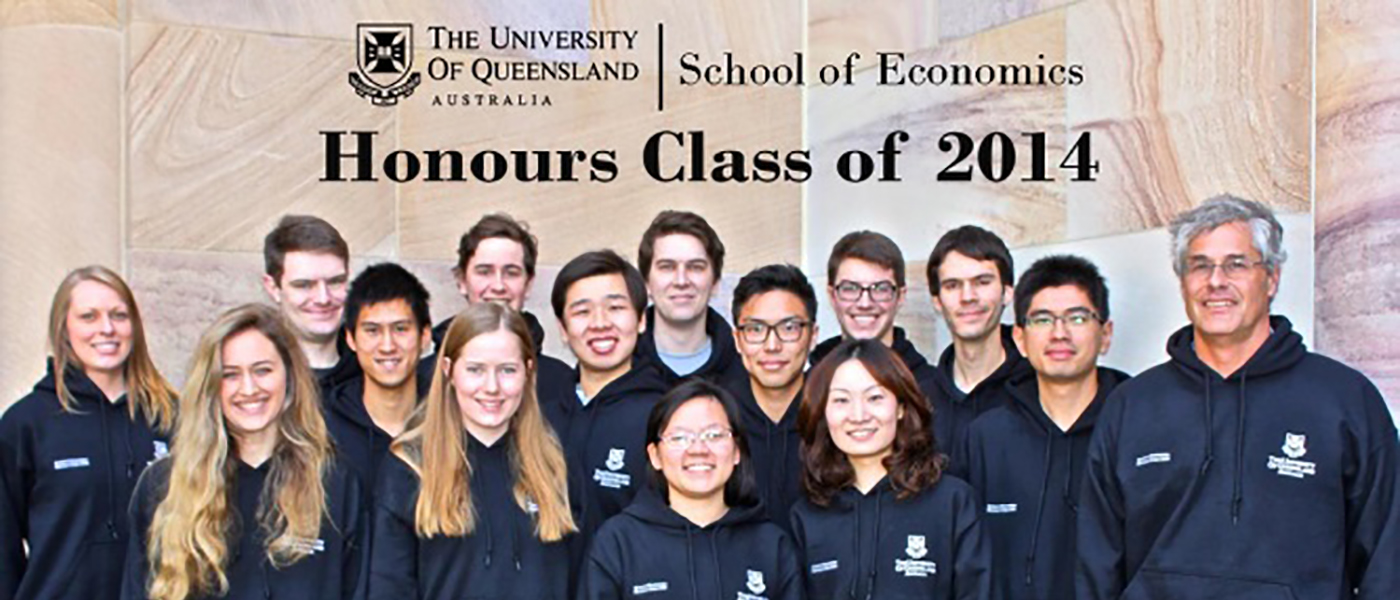
Cheung Anderson
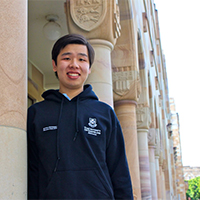
What motivated and/or inspired you to study economics initially?
UQ’s Economics Honours program has a reputation for being challenging and rigorous, as such I decided to undertake honours to test my limits. At the same time I see it as an opportunity to expand my knowledge in the field of economics and gain experience in research, through writing a thesis. I also see honours as an opportunity to enhance my employability.
Why did you choose to undertake Honours?
During high school, the global financial crisis was unfolding before my very eyes and I became rather intrigued. I wanted to learn more about the ideas of economists/political philosophers and how their intellect/ideology influences the global economy. Therefore, upon completion of grade twelve, I decided to study economics at UQ (best decision I’ve made to date).
What are your career aspirations?
After completing honours, I wish to pursue a career related to public policy, either through the public service or private sector. If provided the opportunity, I would also consider further study, such as a PhD.
Christopher Heard
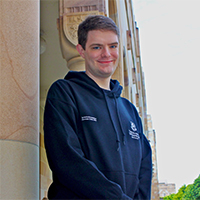 What motivated and/or inspired you to study economics initially?
What motivated and/or inspired you to study economics initially?
I came to economics indirectly. I began my studies in law and biochemistry with a view to understanding the legal aspects of science and technology policy, but I quickly decided that law was not for me. I remember a first year torts lecture that was very critical of academics who apply economic theory to analysing the law, but I thought they might be onto something! Economics provided an excellent opportunity to keep studying policy and business issues in a rigorous way, while drawing on more quantitative and (dare I say) interesting techniques.
Why did you choose to undertake Honours?
The opportunity to undertake advanced coursework was attractive, as was the chance to experience academic research. Honours is also excellent preparation for further study.
What are your career aspirations?
My oldest academic interest is science and, although I am happy to leave the laboratory work to others, it would be great to apply my economics training to (or work in academia studying) industries which draw heavily on science and technology. Fortunately, that gives me a growing list to choose from – my Honours thesis is of particular relevance to public policy and the resources sector, but opportunities in health, agriculture, energy, manufacturing, and science and technology policy are also of interest.
Ben Jackman
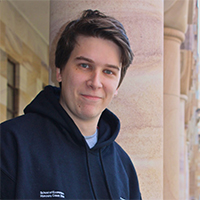 What motivated and/or inspired you to study economics initially?
What motivated and/or inspired you to study economics initially?
While I always had passing interest in economics, I started my academic career at UQ in science. After some time, I realised science wasn't for me, and began looking for another field to study. The global financial crisis drew my attention and, after learning a little about it, I became hooked on macroeconomics and monetary policy.
Why did you choose to undertake Honours?
Honours was a clear choice for me. Honours in Economics gives us exposure to advanced coursework and experience in academic research. It provides opportunities in the industry that wouldn't otherwise be available to us, and allows those of us interested in further study direct entry into international PhD programs.
What are your career aspirations?
I want to be involved in the implementation and development of monetary policy for Australia. Central banks face unique challenges in the 21st century, and I hope I can help in responding to those challenges, as either an academic or a central banker.
Keaton Jenner
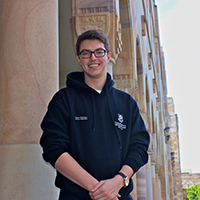 What motivated and/or inspired you to study economics initially?
What motivated and/or inspired you to study economics initially?
I started at UQ straight out of high school and was initially studying a Bachelor of Journalism. I quickly realised that my expectations and the reality of the field did not coincide, and that a career as a reporter or in public relations wasn’t for me. During my first year of university, I had been exposed to some basic economic ideas through some of my elective courses and also the Free to Choose series produced by Milton Friedman. I decided to take some first year economic courses in my second year and found them all really interesting, so I made the switch to a B.Econ/BA.
Why did you choose to undertake Honours?
I wanted to set myself the challenge of the Honours year to see if I could push myself beyond the limits of undergraduate coursework. I was also very keen to write a thesis which would both improve my research skills and also potentially make some contribution to the literature.
What are your career aspirations?
I hope to be working as an economist. Ideally, I will be involved in some kind of applied policy analysis or economic research. Eventually, I would like to work for an international organisation like the World Bank or the IMF.
Christopher Mar
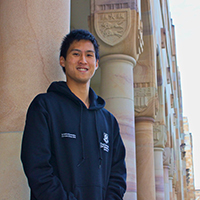 What motivated and/or inspired you to study economics initially?
What motivated and/or inspired you to study economics initially?
I was initially drawn towards economics because of the formal approach it takes in analysing social issues. As I learnt in Introductory Microeconomics (ECON1010), the focus of economics is on explaining why certain outcomes arise, rather than necessarily concluding whether that behaviour is right or wrong. It was this interest in analytical techniques and in the investigation of economic problems that lead me into the field of econometrics.
Why did you choose to undertake Honours?
I have always heard that doing Honours was one of the most challenging but rewarding years that you can do at UQ. But it probably wasn’t until I started tutoring, in my fourth year, when I really made the decision to do Honours. Tutoring provided a first chance for me to dig a little deeper on familiar concepts by discussing economic concepts in my classes and in helping students with their study. This reminded me just how much I enjoyed economics, and triggered a passion within me to explore further these economic ideas. I choose to do Honours in order to learn more advanced economic concepts. The part of the Honours program that I am most excited about is the opportunity to complete a piece of original research in a topic of my own choice.
What are your career aspirations?
After Honours I would like to work for a public policy-making institution.
Belinda McEniery
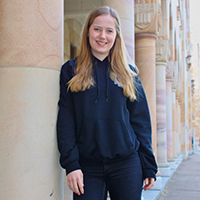 What motivated and/or inspired you to study economics initially?
What motivated and/or inspired you to study economics initially?
After graduating in 2013 with a Bachelor of Economics, I wanted the chance to apply the knowledge I gained in my undergraduate degree to the more challenging and demanding setting provided by the Honours program. The thesis component of the program has the exciting opportunity for students investigate and contribute to an area of interest, in my case, Health Economics. Whilst undertaking this experience within research, Honours students will also have almost unparalleled exposure to some of the School's best academics which is one of the most appealing aspects of the program.
Why did you choose to undertake Honours?
I first took Economics on a whim as a subject in senior school and I was quickly attracted to the inherent rationality and logic of the subject. Since then, Economics has remained an interesting combination of a range of diverse disciplines including mathematics, politics and business whilst having a unique and wide-ranging scope itself.
What are your career aspirations?
In the long run, I am looking to work within public policy development, potentially within the public service or a think-tank.
Andrew Staib
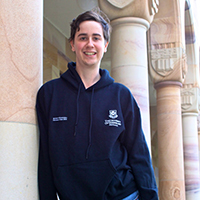 What motivated and/or inspired you to study economics initially?
What motivated and/or inspired you to study economics initially?
There is no one specific trigger point which I can say led me down the path of economics. I took economics in high school and, along with it being one of my favourite subjects, I achieved high marks. I felt as though economics was something that I could both enjoy and excel at.
Why did you choose to undertake Honours?
I learned much from the undergraduate economics program at UQ. However, I felt as though my training lacked some of the rigour that economists typically apply. I chose to undertake Honours so I could gain further understanding of the methods applied by economists to solve economic problems. I believed the UQ honours program would greatly expand my skillset in this regard and add rigour to the methods I use to solve economic problems. Additionally, the UQ Honours program is highly valued in the workforce.
What are your career aspirations?
Ultimately, I would like to some day be in a position to affect policy. Economic policy has tangible effects on the lives of everybody and I would like to be in a position where I could use my economic skills for society's benefit. Having secured a graduate position at the RBA, I have taken a first step in achieving this goal.
Yen Thi Jai Tran
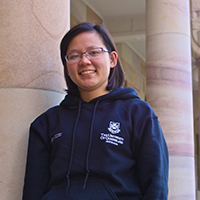 Why did you choose to undertake Honours?
Why did you choose to undertake Honours?
I chose to study Economics because an early exposure to this field captivated me in its intuitive explanations of various phenomenons. My bachelor program developed that intuition into a systematic and critical analytical toolkit. Honours at UQ is my choice after Bachelor of Economics because I see it as an important stepping stone for the higher education that I wish to pursue. Also, UQ is such a friendly, supportive and stimulating study environment. .
What are your career aspirations?
I thoroughly enjoy learning, researching and sharing knowledge through teaching. I therefore aspire to become an academic in my future career.
Cedric Wong
What motivated and/or inspired you to study economics initially?
Throughout my undergraduate studies, I have started to develop a strong interest in applied econometrics for macroeconomics as I am captivated by how information channels through data and how the use of quantitative techniques can be applied to verify economic theories. Therefore, my desire for deeper economics knowledge has led me to pursue an Honours degree. More importantly, I believe I will be given an opportunity to strengthen my quantitative analysis skills through my honours thesis as it focuses on predicting housing price changes in Sydney.
Why did you choose to undertake Honours?
Truth to be told, I disliked economics throughout junior high school until I was in grade 11, I somehow sat through the entire economics class without being distracted. Surprisingly, I was fascinated by the usefulness of economics and how it can be used as a tool for policy analysis and decision-making. Strangely, my grade 11 economics teacher has inspired me to study economics, as I never thought I would have studied a Bachelor of Economics if the teacher happened to be someone else. As a global citizen, I believe the study of economics will allow me to obtain an in depth recognition and a better insight of the world as economics is one of the most essential elements that connects it.
What are your career aspirations?
I have always wanted to work for federal government institutions such as the RBA and the Treasury because it would give me a chance to apply my research and econometrics analytical skills in a practical manner. While I do enjoy economics, my real passion lies within the game of tennis. I hope I would be able to work for the Association of Tennis Professionals in the distant future.
Other 2014 Honours students include:
Sarah Brown
Cameron Gordon
Chun Yai Tai
Yuki Tamura
Varun Venaik


 What motivated and/or inspired you to study economics initially?
What motivated and/or inspired you to study economics initially? What motivated and/or inspired you to study economics initially?
What motivated and/or inspired you to study economics initially? What motivated and/or inspired you to study economics initially?
What motivated and/or inspired you to study economics initially? What motivated and/or inspired you to study economics initially?
What motivated and/or inspired you to study economics initially? What motivated and/or inspired you to study economics initially?
What motivated and/or inspired you to study economics initially? What motivated and/or inspired you to study economics initially?
What motivated and/or inspired you to study economics initially? Why did you choose to undertake Honours?
Why did you choose to undertake Honours?